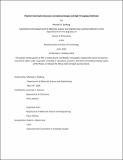Polymer Electrolyte Discovery via Rational Design and High Throughput Methods
Author(s)
Stolberg, Michael A.
DownloadThesis PDF (25.44Mb)
Advisor
Johnson, Jeremiah A.
Shao-Horn, Yang
Terms of use
Metadata
Show full item recordAbstract
Storage of electrical energy is a cornerstone in the global endeavor to lower greenhouse gas emissions—in particular, electrochemical energy storage in the form of batteries can enable the electrification of transport through electric vehicles, as well as aid the transition to renewable energy generation such as wind and solar through stabilizing the grid and mitigating intermittency. Lithium-ion batteries, a pioneering technology to enable portable electronics, are seeing increased use in transportation and grid-scale applications due to their high energy density, and greatly decreasing production costs over the past decade. However, current lithium-ion batteries are reaching the theoretical energy density and must adhere to higher safety standards as they see use in larger scale formats. The next generation of cheaper, safer, and more energy-dense batteries will be enabled by advances in electrolytes which are the focus of this work.
In this thesis, we focus on solid polymer electrolytes, which have the potential to enable more energy-dense batteries, and display improved safety compared to the highly flammable and toxic liquid electrolytes in use today. We detail our work in two main areas: the rational design of highly dissociative ionenes, and the development of a high throughput platform to increase the scale and speed of polymer electrolyte research. In the former, we investigate the impact of anion dissociation energy on ion conduction in solid polymer electrolytes via a novel class of ionenes prepared using acyclic diene metathesis polymerization of highly dissociative, liquid crystalline, fluorinated aryl sulfonimide-tagged ("FAST”) anion monomers. These polyanions form well-ordered lamellae that are thermally stable and provide anionic channels for ion hopping. Electrochemical impedance spectroscopy and differential scanning calorimetry experiments, along with nudged elastic band calculations, suggest that cation motion in these materials operates via an ion hopping mechanism, which is enabled by the highly dissociative nature of FAST anions. In parallel, we developed a high throughput platform to accelerate electrolyte research. We detail the engineering problems and solutions which resulted in an estimated 100X increase in sample throughput with vastly less researcher effort. The platform is then leveraged in two case studies, first by performing the largest one-to-one comparison of lithium and sodium ion conduction in poly(ethylene oxide) to date, and secondly, the platform is employed in a machine learning-guided Bayesian optimization system to explore and optimize the ionic conductivity of electrolytes based upon poly(caprolactone). This work sets the stage for continued automation and data-driven design of polymer electrolytes for safer and more energy-dense batteries.
Date issued
2023-06Department
Massachusetts Institute of Technology. Department of Materials Science and EngineeringPublisher
Massachusetts Institute of Technology